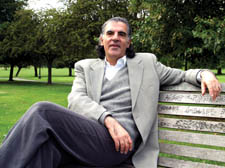 Michael Arditti Michael Arditti |
Romeo and Juliet who fled the Nazis in a boat
Michael Arditti’s book is more of a love story than an account of people fleeing persecution writes Dan Carrier
A Sea Change
by Michael Arditti.
Published by Maia, £8.99. order this book
MICHAEL Arditti did not set out to write a parable. But his new novel A Sea Change is more than just a love story. It contains an important lesson.
The novel is based on the true story of the SS St Louis, a cruise ship which left Hamburg in Germany at the beginning of 1939 destined for Cuba.
On board were refugees desperate to escape the increasing atmosphere of religious, political, economic and social persecution, but were leaving family, friends, homes, businesses and their country behind.
The story of the ship and its passengers is told through the eyes of Karl, a 15-year-old who is not only leaving his home but is setting out on a voyage of personal discovery.
But the parable became clear to Michael as he was mulling over his story.
He found unpleasant parallels between the fate of the characters attempting to escape Nazi Germany with the plight of asylum seekers today.
“As I wrote the book, the whole issue of asylum seekers became more prominent,” he told me at his home in Regent’s Park Road, Primrose Hill.
“I did not try to write a parable for the present day, I wanted to write a love story. This is a first love, it is Romeo and Juliet – the tragedy comes from the world around the two lovers, Karl and Johanna.
“But I am aware of the fact that people were being turned away to face certain death in the way that sometimes our com country sends people away from here to countries to face political oppression and terrible diseases.”
The idea for A Sea Change came to him when he was visiting friends in Washington.
He recalls: “They said to me that I had to go to the new Holocaust memorial museum. To be honest, I had my eyes on a visit to the Smithsonian.
“I thought I would much rather look at the art.”
But his hosts insisted, so he made his way there for nine in the morning.
He continues: “I went in and I did not leave – not even for a bite to eat or a drink of water – until it closed at 5.30pm at night. I was completely enthralled.”
The museum hands visitors an identification card of someone killed in the Holocaust, and allows them to follow the person’s journey.
He said: “I then found in a small alcove the story of the St Louis, and I was overwhelmed by it.
“It is all contained on this boat – the whole Nazi project is played out in miniature. Having a confined space in this manner is useful for a novelist. It highlights the drama – these poor people desperately searching for a home.”
He says he hopes he has written a novel that will surprise his readers.
“It is different from anything else I have done in the past,” he says. But that is one of the reasons I have done it. I don’t want to write the same type of novel each time.
“I want to write new things and I have never written a story like this.”
And it required Arditti to use all of his faculties as a novelist. He says: “I have not taught creative writing, although I once took a small short story course.
“They say the best thing to write about is from your own experience, but that would mean I could only write stories about a forty-something gay man who lives in Primrose Hill, which would be incredibly dull.
“I think it is best to write something that is just on the edge of your experience, and I can just about remember being 15.
“I can identify with the crisis of faith, even though I am not Jewish.”
For some of the more detailed passages, which Arditti has begged me not to reveal in case they give the story away – he sought expert help. He said: “I had the help of two Liberal Jewish Rabbis on religious services. I didn’t know about funeral arrangements or bar mitzvahs.”
The finale of A Sea Change is emotional. Without revealing the ending – “please please don’t do that” says Arditti, “you can say how moved you were, but don’t say why” – Karl and Johanna are made to face harsh choices.
These are choices, says Michael, that highlight the precariousness of the individual when faced with a world that is running out of their control.
|
 Michael Arditti
Michael Arditti 
